I'm using scatter3d and the 3 axes just have two endpoint values. how can I get labels throughout the entire axis, just like the normal plot() function does?
-
This seems very helpful but I'm having trouble doing it. If I type car:::scatter.default it returns : Error in get(name, envir = asNamespace(pkg), inherits = FALSE) : object 'scatter.default' not found but car:::scatter3d.default returns the entire function. Do you I edit the scatter3d.default? When I add the if (axis.scales) code to the scatter3d.default I get an error that saying : Error in match.arg(id.method) : object 'id.method' not found? Do you have the full version of the code edits that I could use? Thanks!! – Megan Nov 22 '11 at 16:51
-
@Megan: That was my error: now fixed below. (Didn't see this because it wasn't under my answer or addressed to me.) Re: full code. I could but then the answer would be somewhat bulky. I'm not sure how the rest of the audience feels about "bulky" answers. – IRTFM Nov 23 '11 at 16:01
-
Note the full version of the code (with another tweak or two) is now linked from http://stackoverflow.com/questions/8231007/having-trouble-executing-the-edits-to-scatter3d-default/ – Ben Bolker Nov 30 '11 at 17:10
2 Answers
Oh well. I took it as a challenge.
Obviously you need to:
require(rgl)
require(car)
require(mgcv) # for the example
Copy the car:::scatter3d.default code and paste it back, assigning it to scatter3d.default.
Add these lines early in the code for scatter3d.default:
showLabels3d <- car:::showLabels3d
nice <- car:::nice
# since you will be losing their connection to the unexposed fns in car
Then in the code block following the second if(axis.scales){ ...}, substitute this code:
if (axis.scales) {
x.labels <- seq(lab.min.x, lab.max.x,
by=diff(range(lab.min.x, lab.max.x))/4)
x.at <- seq(min.x, max.x, by=nice(diff(range(min.x, max.x))/4))
rgl.texts(x.at, -0.05, 0, x.labels, col = axis.col[1])
z.labels <- seq(lab.min.z, lab.max.z,
by=diff(range(lab.min.z, lab.max.z))/4)
z.at <- seq(min.z, max.z, by=diff(range(min.z, max.z))/4)
rgl.texts(0, -0.1, z.at, z.labels, col = axis.col[3])
y.labels <- seq(lab.min.y, lab.max.y,
by=diff(range(lab.min.y, lab.max.y))/4)
y.at <- seq(min.y, max.y, by=diff(range(min.y, max.y))/4)
rgl.texts(-0.05, y.at, -0.05, y.labels, col = axis.col[2])
}
(You may need to replace the code for scatter3d.formula so that doesn't look in the car NAMESPACE for the routinely dispatched scatter method. I simply replaced the scatter3d call inside car:::scatter3d.formula with "scatter3d.default" so the interpreter would first look at the newly defined function.)
Edit: a better method than mucking with scatter3d.formula is to assign the car namespace/environment to the new function with this code:
environment(scatter3d.default) <- environment(car:::scatter3d.formula)
Then if you do this:
scatter3d(prestige ~ income + education, data=Duncan)
You get this (taken with a screenshot program)

- 258,963
- 21
- 364
- 487
-
10Would like to be able to +more for the amount of effort you put in here. – Ben Bolker Nov 21 '11 at 01:39
-
@Ben Bolker: You probably have an idea how many errors I made in the process of figuring this out. – IRTFM Nov 21 '11 at 02:32
-
Great answer, but I'm having a bit of trouble running it. Is scatter3d the same as `scatterplot3d`? I presume you also need to run "data(Duncan)" before trying to plot. – csgillespie Nov 21 '11 at 09:32
-
No, `scatter3d` is in pkg:car and `scatterplot3d` is in pkg:scatterplot3d. I did not need to run data(Duncan) but if one did not run require(car) (or library(car)) , one might need to do so. The RGL version in pkg:car lets you interactively control the rotation of the axis and plot and the plane points and axis lables move together. `scatterplot3d` results in a static graphic. You cannot move it interactively and it also does not have a formula interface as far as I can tell. – IRTFM Nov 21 '11 at 13:40
-
1Nice. Note you can use `rgl.snapshot` to generate images of `rgl` plot windows. – James Nov 22 '11 at 11:54
There is a new option that adds interior axis labels, from the help of scatter3d:
axis.ticks
if TRUE, print interior axis-“tick” labels; the default is FALSE. (The code for this option was provided by David Winsemius.)
- 15,186
- 15
- 73
- 127